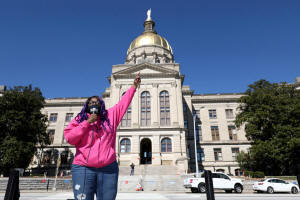Elections officials fear Georgia law could politicize voting operations
 Send a link to a friend
Send a link to a friend
 [April 01, 2021]
By Julia Harte and Joseph Ax [April 01, 2021]
By Julia Harte and Joseph Ax
WASHINGTON (Reuters) - Election officials
in conservative and liberal parts of Georgia say a new law allowing a
Republican-controlled state agency to take over local voting operations
could make the process too partisan.
Voting rights advocates have also warned that the provision, part of
sweeping voting restrictions signed into law last week by Governor Brian
Kemp, targets Democratic bastions such as Atlanta's Fulton County that
helped deliver the party control of the White House and Congress in
recent elections.
The new law has mostly gained attention for its measures to strengthen
absentee ballot identification requirements, curtail ballot drop box use
and penalize members of the public who offer food and water to voters in
line.
Months after former Republican President Donald Trump falsely claimed
voter fraud in the 2020 elections, Republican backers say Georgia's law
is needed to restore confidence in election integrity. Civil rights
groups have filed three lawsuits asserting the law illegally restricts
voting rights, particularly for minority voters.
The legislation authorizes the Republican-majority legislature to
appoint the state election board's majority while demoting the elected
secretary of state, Georgia's top election official, to a non-voting
position.

It also allows the state board to remove local supervisors it deems
derelict and replace them with individuals of its choosing.
That power has alarmed Democrats and civil rights organizations in light
of Trump's unprecedented pressure campaign to overturn the results in
key Democratic counties.
But even some election officials from Republican-leaning counties said
they opposed allowing the state board to take over local elections, a
Reuters survey of the state's 159 counties found.
'DANGEROUS PATH'
Of the 55 that responded, officials in 11 counties of varying sizes and
political leanings - Bartow, Macon-Bibb, Cobb, DeKalb, Floyd, Heard,
Jones, Murray, Paulding, Quitman and Tattnall - said the law gave the
state too much control over election administration. Traditionally,
locally appointed nonpartisan or bipartisan boards and judges oversee
issues such as voter eligibility, polling place locations and vote
certification.
"If we don't rely on and hire smart people with institutional knowledge,
and the process becomes politicized, then we go down a very dangerous
path," said Baoky Vu, a Republican on the DeKalb County elections board.
Election officials in 12 other counties did not express concerns with
the law, while 32 officials declined to comment.
Georgia is among several battleground states, including Florida and
Arizona, where Republican lawmakers have pushed new voting restrictions
they say will curb voting fraud, despite research showing such instances
are rare in the United States.
Voting rights advocates say some efforts are intended to punish election
officials who, like Georgia Secretary of State Brad Raffensperger, a
Republican, rebuffed Trump's demand to change the election outcome.
[to top of second column]
|

Kimberly Latrice Jones speaks during a gathering outside of the
Georgia State Capitol to protest HB 531, which would place tougher
restrictions on voting in Georgia, in Atlanta, Georgia, U.S. March
4, 2021. REUTERS/Dustin Chambers//File Photo

Asked for comment, Kemp's spokeswoman pointed to a Fox News column
the Republican governor published on Wednesday, arguing that the law
"makes it easy to vote by expanding access to the polls and harder
to cheat."
The bill's main Republican sponsors in the legislature did not
respond to requests for comment.
The law underscores how deeply Trump's fraud assertions have
penetrated his party. A Reuters/Ipsos poll in February found 62% of
Republicans were "very concerned" that elections were tainted by
ineligible voters.
'FRANKLY SCARY'
Some election officials said that far from improving trust in
elections, the law could diminish local oversight.
Joseph Kirk, the elections supervisor in Bartow County, which Trump
won by 50 percentage points in 2020, said he found it "frankly
scary" the state would replace a bipartisan local board with a
political appointee.
"You're basically allowing the general assembly to appoint people
who may not know anything about running elections," said Deidre
Holden, the elections supervisor in heavily Republican Paulding
County.
But in rural Lowndes County, elections supervisor Deb Cox told
Reuters the new measure would improve upon the current oversight
procedures for election mismanagement.
Aklima Khondoker, Georgia state director of All Voting is Local, a
voting rights group, said she has heard from election officials that
some are afraid to criticize a measure that effectively allows state
lawmakers to remove them from their jobs.

The law, she said, is "holding our counties hostage."
Amy Steigerwalt, a political science professor at Georgia State
University, said unproven voter fraud allegations could
theoretically serve as the basis for suspending a local official.
The law cites long lines as a reason for possible intervention,
though its other provisions will likely worsen waits in populous
counties, she added.
"The question is, how are these decisions going to be made?"
Steigerwalt said. "What type of 'malfeasance' or 'nonfeasance' might
someone be accused of?"
(Reporting by Julia Harte and Joseph Ax; Editing by Colleen Jenkins
and Aurora Ellis)
[© 2021 Thomson Reuters. All rights
reserved.] Copyright 2021 Reuters. All rights reserved. This material may not be published,
broadcast, rewritten or redistributed.
Thompson Reuters is solely responsible for this content. |